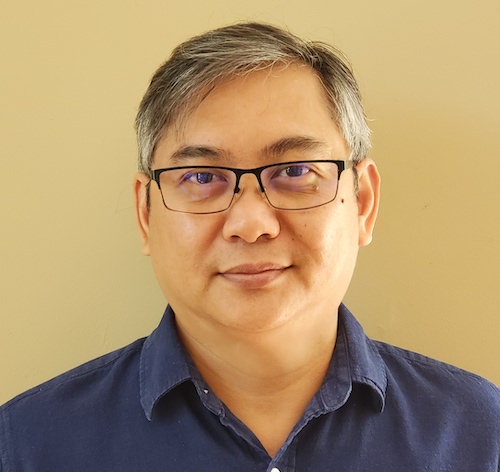Francis de los Reyes
Professor, University Faculty Scholar
Fitts-Woolard Hall 3323
Bio
Dr. de los Reyes is a Professor of Civil, Construction, and Environmental Engineering, Associate Faculty of Microbiology, and Training Faculty of Biotechnology at North Carolina State University. In 2013, he was named a University Faculty Scholar. He teaches undergraduate and graduate classes on wastewater treatment plant design, environmental biotechnology and microbiology, fundamentals of environmental engineering, and water and sanitation for developing countries.
He has conducted workshops for wastewater treatment plant operators and professionals in the US and the Philippines. He has also worked in water and sanitation issues in developing countries, and has collaborations in the Philippines, India, China, South Africa, Pakistan, Ghana, and Malawi. He is a TED Fellow (www.ted.com), and his TED talk on sanitation has been viewed over 800,000 times. He has received the Gordon Fair Award in Environmental Engineering Education (WEF), the Outstanding Teacher, Outstanding Extension, and Global Outreach Awards from NC State, and is a Balik-Scientist awardee of the Philippine Government. He received Outstanding Alumnus Awards from the University of the Philippines, Iowa State University (Outstanding Young Alumnus), Phil. Science HS (Gawad Lagablab Award), and Marist School. He has received the US National Science Foundation CAREER Award, the Steven Dentel Award for Global Outreach from AEESP, and the AAEE Research Honor Award. His group’s pit emptying technology (Flexcrevator and Excluder) has won the RELX Group Environmental Challenge Award, and in 2020 received the Patents for Humanity Award. In 2020, he was named Corresponding Member of the National Academy of Science and Technology of the Philippines.
His students have won state (NC AWWA/WEA), national (WEF, AAEE, NSF) and international (IWA) awards for research (fellowships, presentations, posters). Current and past research projects include: competition between filaments and floc-formers in activated sludge, ecophysiology of nitrifiers and denitrifiers in microbial floc, N removal from swine waste, fate of bioagents in landfills, microbial characterization of landfills, molecular techniques for groundwater remediation sites, foam control methods, factors affecting fats, oils, and grease deposits in sewers, wastewater treatment for rural areas, water reuse systems, novel molecular techniques for detecting denitrifiers, energy from co-digestion, and solutions for pit latrine emptying problems.
Dr. de los Reyes is on the editorial board of Phil. Science Letters, and has served on the editorial boards of Water Research and Journal of Environ. Eng. He is a Past President and Board Chair of the Philippine-American Academy of Scientists and Engineers. He has been a consultant for industry, engineering firms, and public utilities on activated sludge operation, solids separation problems, sanitation technologies, and molecular microbiology techniques.
Education
B.S. Agricultural Engineering University of the Philippines at Los Banos 1990
M.S. Civil Engineering Iowa State University 1994
Ph.D. Environmental Engineering University of Illinois, Urbana-Champaign 2000
Area(s) of Expertise
Dr. de los Reyes' research focuses on biological processes and combines modeling, bioreactor experiments, and molecular microbial ecology tools in addressing fundamental and practical issues in environmental biotechnology and environmental engineering. Another research focus is sanitation in developing countries. He is interested in two main areas: the interface between microbial ecology and environmental engineering, and global sanitation. At the ecology-engineering interface, molecular techniques are utilized as powerful tools for the analysis of microbial populations in engineered and natural treatment systems. Environmental process engineering is approached from a fundamental standpoint, combining the insights from molecular (DNA- and RNA-based) approaches with innovative process experiments and modeling. In global water, sanitation, and hygiene (WaSH), improving the technologies along the entire sanitation chain is the main focus. His team has developed a new technology for safely and hygienically emptying pit latrines in Africa and Asia. His recent research includes structure-function studies in wastewater treatment systems, landfills, soils, and decentralized sanitation systems.
Publications
- Estimating rates of change to interpret quantitative wastewater surveillance of disease trends , SCIENCE OF THE TOTAL ENVIRONMENT (2024)
- Linking microbial population dynamics in anaerobic bioreactors to food waste type and decomposition stage , WASTE MANAGEMENT (2024)
- Microbial community assembly in engineered bioreactors , WATER RESEARCH (2024)
- Monitoring SARS-CoV-2 RNA in wastewater from a shared septic system and sub-sewershed sites to expand COVID-19 disease surveillance , Journal of Water and Health (2024)
- Perturbations to common gardens of anaerobic co-digesters reveal relationships between functional resilience and microbial community composition , APPLIED AND ENVIRONMENTAL MICROBIOLOGY (2024)
- Anaerobic Digestion as a Core Technology in Addressing the Global Sanitation Crisis: Challenges and Opportunities , ENVIRONMENTAL SCIENCE & TECHNOLOGY (2023)
- Effect of removal of inhibitors on microbial communities and biogas yield of Jatropha curcas seeds during continuous anaerobic digestion , JOURNAL OF CLEANER PRODUCTION (2023)
- Growth of Dunaliella viridis in multiple cycles of reclaimed media after repeated high pH-induced flocculation and harvesting , SCIENCE OF THE TOTAL ENVIRONMENT (2023)
- Microbial community function and bacterial pathogen composition in pit latrines in peri-urban Malawi , PLOS Water (2023)
- Microplate-Based Cell Viability Assay as a Cost-Effective Alternative to Flow Cytometry for Microalgae Analysis , ENVIRONMENTAL SCIENCE & TECHNOLOGY (2023)
